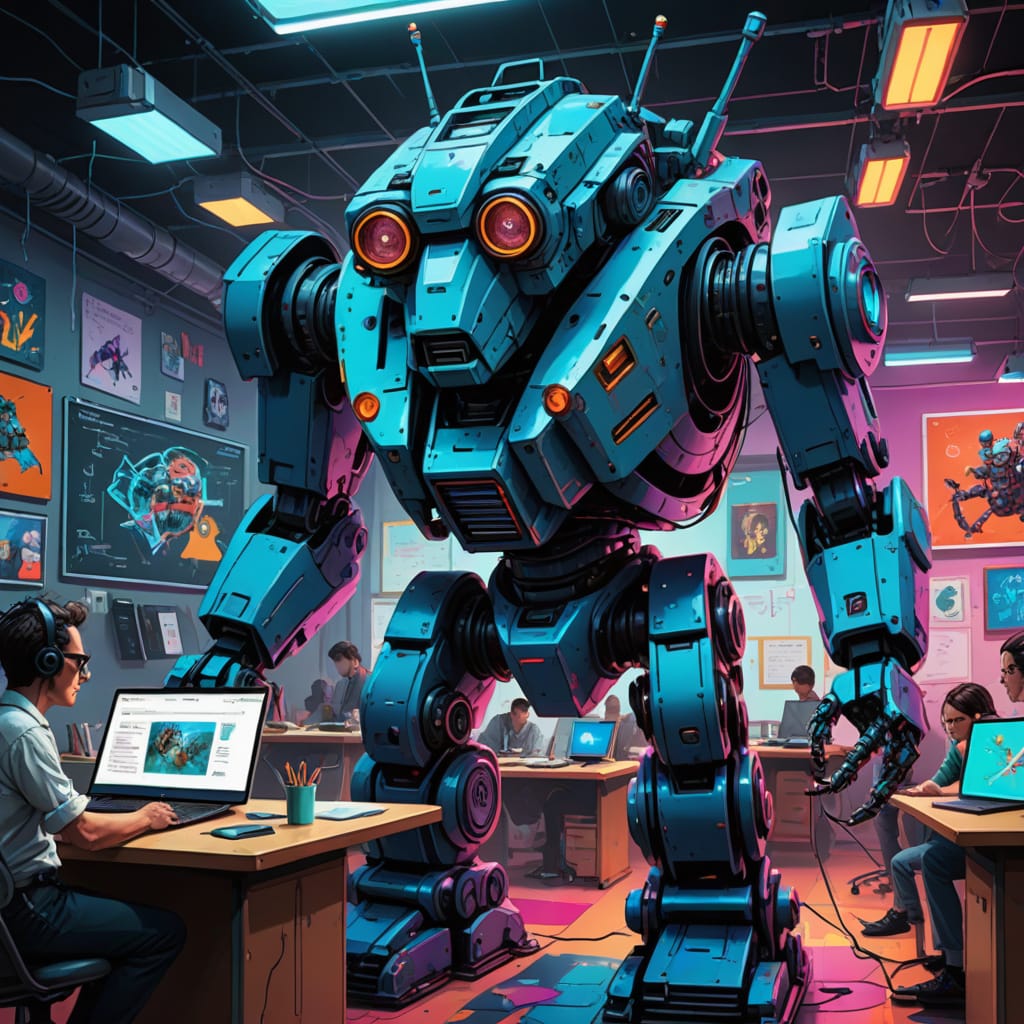In what historians will surely record as the tech industry’s most elaborate practical joke, venture capitalists and tech corporations spent a decade if not more than that, convincing everyone and their grandmother to learn to code, only to immediately pivot to AI systems that can code better than humans while requiring nothing more than vague gestures at competence.
The Great Coding Crusade (2010-2020)
Remember when coding was going to save humanity? When learning Python was presented as the only thing standing between you and inevitable unemployment? Those were simpler times.
For years, we watched as tech giants, educational institutions, and even world leaders sang from the same hymnal: “Learn to code or perish.” Microsoft partnered with schools to offer computer science education. Apple, not to be left, ran coding workshops for children through its “Everyone Can Code” program1. Governments from around the world scrambled to add programming to elementary school curricula2.
The message was clear: coding was the latin of our times – the universal language that would separate the employed from the unemployable. Former US president Barack Obama learned to code. Karlie Kloss learned to code. Your 87-year-old neighbor who still prints out emails probably signed up for a Codecademy account.
“It makes perfect sense,” explained Brantley Woodworth, founder of seven failed startups and self-described “thought leader” who now exclusively communicates through LinkedIn posts. “We needed to train millions of programmers so they could create the AI that would make programming obsolete. It’s just basic disruption economics.”
From “Everyone Should Code” to “No One Needs To Code”
Fast forward to 2025, and the tech industry has completed its majestic pivot. The same companies that spent billions convincing us to learn JavaScript are now spending billions developing AI that makes JavaScript knowledge as relevant as knowing how to boil an egg.
Microsoft’s GitHub Copilot now generates up to 80% of corporate developers’ code3. Venture capital investment in AI coding tools reached $16 billion in the last year alone – three times the previous year’s amount. And according to researchers at the US Department of Energy’s Oak Ridge National Laboratory, there’s a “high chance” AI will replace software developers entirely by 20404.
“We’ve entered the golden age of what we call ‘vibecoding,'” explains Melody Ventura, Chief Innovation Evangelist at TechnoSynergy Solutions. “You don’t write code anymore. You just sort of… vibe with the machine, and it writes the code for you. It’s very spiritual.”
Indeed, Microsoft’s once-feared CEO Satya Nadella now refers to human programmers as “the conductors of an AI-enhanced orchestra” – which is corporate speak for “we’ll still need humans to tell the robots what to do, at least until the robots figure that part out too.”
The Birth of “Vibecoding”: Just Tell AI What You Want, Bro!
In perhaps the most predictable development since Mark Zuckerberg’s continued failure to appear human (despite wearing gold chains and changing his wardrobe to appear buff and cool), we’ve now entered the era of “vibecoding” – where even people with zero technical knowledge can build functional applications5.
“I built a podcast transcription tool, a social media organizing app, and even a fridge-scanning app that suggests lunch ideas for my son,” boasted one user in a viral post. “And I know absolutely no Python, JavaScript, or C++.”
The workflow is elegant in its simplicity:
- Tell the AI program (like Cursor or Replit) what you want
- Keep telling the AI what you want, but angrier
- Accept something vaguely resembling what you want
- Claim victory on X (formerly Twitter)
The approach has been dubbed “prompt engineering,” which is a fancy way of saying “typing English sentences and hoping the computer understands you,” a skill that anyone who’s ever used Siri knows is far from guaranteed.
The VC Money Printer Goes Brrrrr
None of this would be possible without the unfathomable amounts of venture capital being thrown at AI coding tools. VCs are betting billions on these technologies for three primary reasons6:
- Scalability: AI coding tools can serve millions of developers simultaneously, unlike human coding instructors who insist on “sleeping” and “having personal lives.”
- Recurring Revenue: Subscription-based AI tools provide steady cash flow, unlike humans who keep demanding salary raises.
- Investor FOMO: No one wants to be the Venture Capitalist (VC) who missed out on “the GitHub of AI” or “the Uber of code generation,” even if those comparisons make absolutely no sense.
“The global software market is projected to surpass $1 trillion by 2030,” explained venture capitalist Thaddeus Wellington IV, speaking from his yacht named ‘Disruptor.’ “Any technology that makes development faster and cheaper is worth investing in, especially if it generates endless Medium thinkpieces about ‘the future of work.'”
Programming Skills in the Age of AI: From “Hello World” to “Hello, I’m Obsolete”
As AI coding tools continue their inexorable march toward dominance, the skills required of human programmers are undergoing a radical transformation. Instead of memorizing syntax and debugging algorithms, tomorrow’s programmers will need to master the art of explaining things to increasingly powerful yet still oddly literal machine intelligences.
“The nature of programming work will change dramatically,” noted Thomas Dohmke, CEO of GitHub, while unveiling yet another AI tool designed to eliminate the need for human input. “Developers will become guides and directors of AI agents.”
In other words, programming is evolving from a technical skill to a managerial one. Soon, the most valuable skill in tech won’t be knowing how to code – it’ll be knowing how to delegate to the machines without triggering a Skynet scenario.
The Junior Developer Extinction Event
Perhaps the most profound impact of AI coding tools will be on entry-level programming positions. As one tech leader bluntly put it: “Junior software developers will be the first to go.”7
This creates a fascinating paradox: if junior positions disappear, how will anyone gain the experience necessary to become a senior developer? The industry’s solution appears to be “not our problem,” which is consistent with its approach to most externalities.
“The biggest challenge will be training the next generation of software architects,” admitted one executive. “With fewer junior dev jobs, there won’t be a natural apprenticeship to more senior roles.”
The solution, according to most tech leaders, is for aspiring programmers to focus on “higher-level skills” like system design and architecture – conveniently ignoring that these skills have traditionally been developed through years of hands-on coding experience that may no longer exist.
Who Benefits From This Brave New World?
Amidst all this disruption, one might wonder: who actually benefits from this shift away from human coding?
The most obvious winners are the tech giants selling AI coding tools and the VCs funding them. Microsoft’s GitHub Copilot boasted 1.3 million users earlier this year, up 30% from the previous quarter. For just $10 per month, developers can outsource their creativity and problem-solving to an AI trained on other people’s code – a bargain at twice the price!
The other big winners are senior developers who’ve already established their careers. These tech veterans can leverage AI tools to enhance their productivity by 10-30%, according to current studies. At KPMG, developers using GitHub Copilot reportedly save an average of 4.5 hours per week – time they can now dedicate to more important tasks like attending meetings about why their projects are behind schedule.
The losers? Everyone who took “learn to code” advice seriously over the past decade, educational institutions that invested heavily in computer science programs, and economies that banked on programming as a pathway to the middle class.
The Cycle of Tech Hype: A Tale as Old as 2007
If there’s a lesson to be learned from this whiplash-inducing reversal, it’s that the tech industry’s advice should always be taken with enough salt to cause hypertension.
Remember when cryptocurrencies were going to bank the unbanked, Virtual Reality (VR) was going to replace physical reality, and the Metaverse was going to be anything other than a digital ghost town where Mark Zuckerberg’s avatar can finally make friends with humans?
The “learn to code” movement follows the same pattern: identify a genuine need (more software developers), blow it wildly out of proportion (EVERYONE MUST CODE OR STARVE!), fund a frenzy of startups and educational initiatives (Coding bootcamps! Hour of Code! Coding toys for infants!), then completely reverse course when a new technology emerges (AI will code for us now, thanks for playing along – until next time!).
So… Should You Learn to Code or Not?
Despite the AI coding revolution, learning to code isn’t completely worthless – much like learning Latin isn’t completely worthless. It might not get you a job, but it will help you understand how the world works and give you something interesting to mention at dinner parties.
As one analyst put it: “AI is not replacing programmers; it’s raising the skill level needed.” This is comforting in the same way that telling farmers during the Industrial Revolution that machines weren’t replacing agriculture, just “raising the efficiency level needed,” would have been comforting.
The truth is that coding, like all skills in our accelerating technological landscape, has a half-life. What matters isn’t the specific syntax you learn today, but your ability to adapt to whatever bizarre new paradigm emerges tomorrow.
Perhaps the most honest assessment comes from labor economist David Autor at MIT, who noted: “AI will significantly impact the profession of software developers, and this change will happen more rapidly for them than for other occupations.”
In other words, programmers – the very people who built the tools that disrupted countless other industries – are now getting a taste of their own medicine. There’s a certain poetic justice to that, if not actual justice.
Conclusion: The More Things Change, The More They Become JavaScript Frameworks
As we stand at the crossroads of human and machine programming, one thing is certain: the only constant in tech is change, and the only reliable advice is to be skeptical of advice from people trying to sell you something.
Will AI completely replace human programmers? Probably not entirely. There will always be a need for humans to explain to the machines what other humans actually want – at least until the machines figure that out too.
In the meantime, perhaps we should all take comfort in the words of software developer and blogger Laurie Voss: “AI will create many, many more programmers, and new programming jobs will look different.”8 Just as spreadsheets didn’t eliminate accountants but changed what accountants do, AI coding tools won’t eliminate programmers but will transform programming into something we might barely recognize.
And if that doesn’t work out, there’s always blockchain. I hear that’s going to change everything any day now.
Support TechOnion: Help Us Decode the Tech Industry’s Elaborate Jokes
Are you enjoying our satirical dissection of the tech industry’s “learn to code” bait-and-switch? Help us continue vibing with our AI overlords by supporting TechOnion! For just the price of a coding bootcamp (approximately $15,000), you can help our one-man operation stay afloat in a world where even writing satire will soon be automated. Don’t worry – we promise to use your donation to learn prompt engineering so we can stay relevant until at least 2027. Remember: in the age of AI-generated content, supporting human-written satire is practically an act of historical preservation! Buy Us A Chai Latte Here!
References
- https://www.forbes.com/councils/forbesbusinessdevelopmentcouncil/2023/03/14/coding-education-is-crucial-to-american-business-success-3-ways-businesses-can-help/ ↩︎
- https://upsa.edu.gh/upsa-to-make-coding-a-compulsory-course-for-all-students-vc/ ↩︎
- https://www.nytimes.com/2025/02/20/business/ai-coding-software-engineers.html ↩︎
- https://brainhub.eu/library/software-developer-age-of-ai ↩︎
- https://e.vnexpress.net/news/perspectives/readers-views/ai-is-not-replacing-programmers-it-s-raising-the-skill-level-needed-4855902.html ↩︎
- https://www.linkedin.com/pulse/vcs-developers-enthusiastic-ai-coding-tools-software-avinash-dubey-onsjf ↩︎
- https://www.cio.com/article/3509174/ai-coding-assistants-wave-goodbye-to-junior-developers.html ↩︎
- https://seldo.com/posts/ai-effect-on-programming-jobs ↩︎





GIPHY App Key not set. Please check settings
One Comment